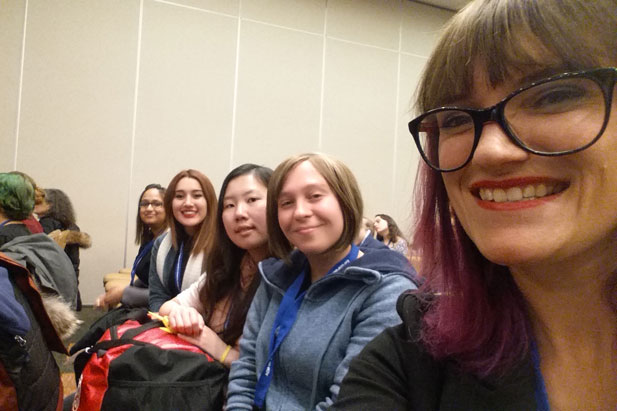Female Computer Science students inspired by stories told at conference
March 31, 2016

Storytelling can be an incredibly powerful motivational tool: it can help break down barriers, capture imaginations and change the way people view themselves and others. Often, hearing someone else’s story can help confirm you’re on the right track, and that you’re not alone in your experiences.
At the 2016 Canadian Celebration of Women in Computing Conference (CAN-CWiC 2016), recently held in Ottawa, Ontario, seven female Computer Science students from the University of Ontario Institute of Technology’s (UOIT) Faculty of Science heard encouraging stories from women across Canada who work in the technology field. These women spoke of their experiences overcoming personal and career challenges, which helped them get to where they are today.
Master of Science (Computer Science) candidate Adele Hedrick enjoyed hearing from Susan Ibach, Senior Technical Evangelist, Microsoft Canada. Before joining Microsoft, Ibach spent several years working at a consulting firm in a variety of development roles, then switched jobs to teach coding, databases and project management.
“I can relate to Susan Ibach’s circumstances and winding career path,” said Hedrick. “She is a very enthusiastic person with a vibrant personality. My favourite quote from her was, ‘Don't do anything unless it excites you and scares you,’ which resonated deeply for me.”
Several speakers also brought up the topic of the ‘impostor syndrome’: feeling like you don’t belong in your chosen field, despite evidence to the contrary.
“I have felt like an impostor many times - at school, or working as a web developer, or working as a self-employed programmer,” Hedrick explained. “I can't pinpoint when that feeling started, or why. I know I am a hard worker with good grades and have never shied away from a computer science challenge, yet many times I would find myself feeling like I don't measure up to my peers.”
Hedrick says her unique academic path may have contributed to her impostor feelings. She earned her Bachelor of Computer Science degree at UOIT in 2012, and then stepped away from the field to have two children and earn her Concurrent Bachelor of Education at UOIT in 2014. She returned to the university in the Fall of 2015 to work on her master’s degree. “It was quite an adjustment to go from playing peek-a-boo all day, to diving into machine learning (a form of computer artificial intelligence) using the Python programming language.”
The opportunity to hear from other women with similar experiences was comforting, and helped Hedrick take control of her feelings. “Putting a name on the impostor syndrome has helped me reason through the feeling and shut it down so I can move on.”
Conferences like the one in Ottawa usually include career fairs and technical tracks, providing students with networking and skills-development opportunities. “I was motivated to push hard in my course work and research,” Hedrick said. “In addition, the career fair gave me a chance to practice networking with recruiters and ask questions about the type of skills they are looking for in a new employee.”
Overall, Hedrick found it incredibly empowering to feel like she is part of a larger community. “This conference provided a huge confidence boost when it comes to my skills and ability to contribute to the field of computer science. Even a few months afterward, I still feel less alone in the world, and I have made stronger friendships with the other female UOIT students who attended.”



